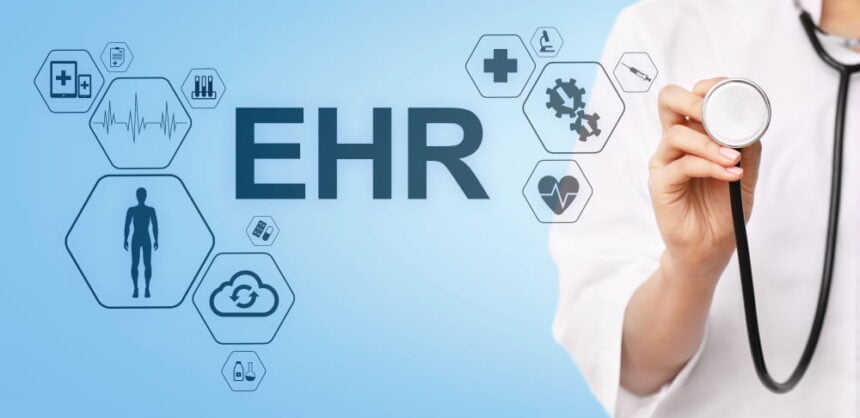Electronic Health Records (EHR) are digital records of patient health information collected over time and from multiple sources, such as hospitals, clinics, laboratories, and pharmacies. Over the past ten years, EHR systems have grown in popularity in the healthcare sector, with the best EHR systems setting the standard for enhancing procedures and assisting patients. This article seeks to define EHR and the advantages of the best EHR systems currently on the market. Here is the Some Top EMR Software’s, Epic EMR, Cerner EMR, Allscripts EMR Software.
What is Electronic Health Record (EHR)?
An electronic health record (EHR) is a digital record of a patient’s health history, including medical and treatment history, allergies, medications, and test results. EHR systems give healthcare professionals secure, quick, and efficient access to patient records, giving them a more complete picture of a patient’s medical history. EHR systems also enable collaboration among healthcare professionals, ensuring that they have access to the most current and correct patient data.
Benefits of EHR Systems
EHR systems have numerous benefits for healthcare providers and patients. Some of the top benefits of EHR systems include the following:
- Improved patient Care: EHR systems offer a thorough and accurate record of a patient’s medical history, enabling medical professionals to make better treatment choices. Better patient outcomes and better general health may result from this.
- Increased Efficiency: EHR systems automate administrative duties like keeping patient records and filling out paperwork, freeing up healthcare professionals to devote more time to patient care.
- Better Communication: EHR systems allow healthcare providers to communicate with one another quickly and efficiently, ensuring that they have access to the most up-to-date patient information.
- Cost Savings: By doing away with the need for paper records, streamlining administrative procedures, and decreasing medical errors, EHR systems can significantly lower healthcare expenses.
Limitations of EHRs
- Cost: EHRs can be expensive to implement, maintain, and upgrade. The cost can be a significant barrier for small healthcare providers or clinics, which may struggle to afford the upfront and ongoing costs.
- Learning Curve: EHRs require healthcare providers to learn new software and processes, which can take time and effort. Additionally, some EHR systems may not be intuitive or user-friendly, leading to frustration and potential errors.
- Technical Issues: EHRs are reliant on technology, and like any technology, they are occasionally subject to bugs, system failures, and other technical difficulties. Technological issues may have an impact on patient treatment and may necessitate time-consuming maintenance.
- Data Security: EHRs contain sensitive patient information, making them vulnerable to data breaches, cyber-attacks, and other security threats. Healthcare providers must protect patient information and comply with privacy regulations.
Average Cost of EHRs
The price of EHRs can vary significantly based on a number of variables, including the size of the healthcare organization, the features and capabilities of the EHR system, and the degree of customization necessary. Small practices (1-3 providers) paid about $32,000 on average for EHR systems, whereas medium-sized practices (4–10 providers) paid an average of $130,000, and big practices (more than ten physicians) paid an average of $260,000.
Top Electronic Health Record (EHR) Systems: Features and Benefits for Healthcare Providers and Patients
Numerous EHR systems are available today, each with unique features and benefits. Some of the top EHR systems include:
- Epic: Epic is one of the most widely used EHR systems in hospitals, known for its comprehensive suite of features and user-friendly interface. Epic offers a range of tools that help healthcare providers manage patient care, including clinical decision support, patient portals, and telemedicine capabilities. Many large healthcare organizations, including the Mayo Clinic and Cedars-Sinai Medical Center, have adopted Epic.
- Cerner: Cerner is another popular EHR system used in hospitals. Cerner’s platform includes population health management, electronic prescribing, and customizable workflows. Many healthcare organizations, including Kaiser Permanente and the University of Missouri Health Care, have adopted Cerner EMR.
- Allscripts: Allscripts is a cloud based EHR system that offers a range of features, including electronic prescribing, patient portals, and customizable templates. Allscripts is known for its ease of use and has been adopted by many healthcare organizations, including Cleveland Clinic and Geisinger Health.
- Meditech: Meditech is a comprehensive EHR system that includes features such as patient portals, clinical decision support, and revenue cycle management. Many healthcare organizations, including Boston Children’s Hospital and St. Joseph’s Healthcare, have adopted Meditech.
Final Thought!
Electronic Health Records (EHR) are digital records of patient health information collected over time and from multiple sources. Many advantages of EHR systems include better patient care, higher effectiveness, improved communication, and cost savings. Leading EHR platforms like Epic, Cerner, Allscripts, and Athenahealth are well-liked options for healthcare businesses seeking to enhance their procedures and assist patients because they provide a wide range of features and advantages.

